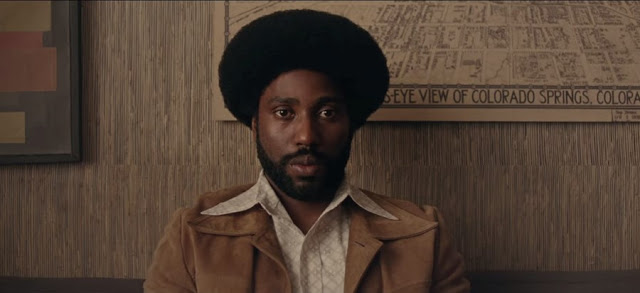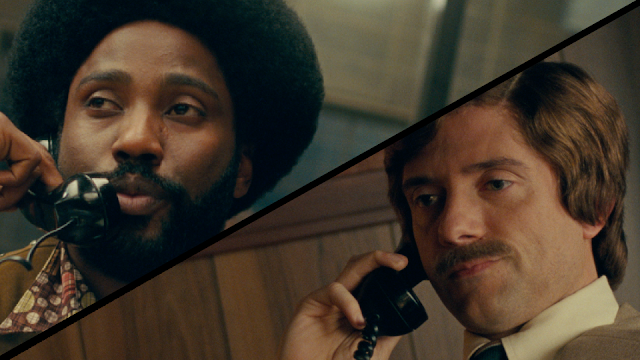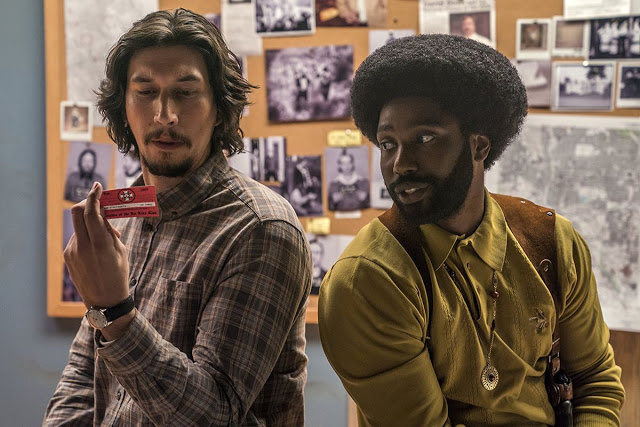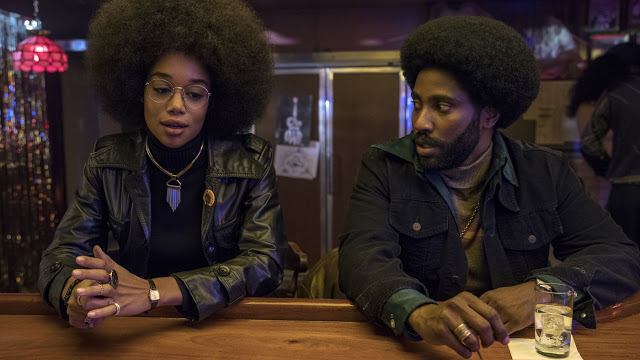During an interlude of rare tranquility in BlacKkKlansman, undercover detective Ron Stallworth (John David Washington) and his sorta-girlfriend, Patrice (Laura Harrier, from Spider-Man: Homecoming), stroll through a serene wooded area, highlighted by a bubbling stream and colorful foliage. They’re talking, as fledgling lovers tend to do, about their favorite films, and Ron asks Patrice whether she prefers Super Fly or Shaft. Patrice, the president of the Black Student Union at Colorado College, is adamant. “Shaft,” she answers decisively, explaining that she has no use for something like Super Fly, which perpetuates the stereotype of black men as pimps and thugs. Taken aback by the severity of her criticism, Ron urges Patrice to relax. After all, he says in protest, “it’s just a movie!”
That sort of dismissive, laissez-faire hand-waving—the fallacious notion that art should simply be absorbed rather than analyzed, contextualized, and debated—has never and will never apply to the motion pictures of Spike Lee. For more than three decades now, the director has made all manner of “joints”—war epics and crime thrillers, sweeping period biopics and intimate family dramas, good movies and bad ones—but all of them share a purpose that goes beyond entertainment (though they are often entertaining). Lee is one of America’s most proudly political filmmakers, using his work not just to provide audiences with a few hours of diverting pleasure but to educate, instigate, preach, and rattle. BlacKkKlansman, which tells the story of Ron’s infiltration of the Ku Klux Klan in 1972 Colorado, fits squarely within this lineage. It is by turns a suspenseful police procedural, a powerful piece of agitprop, and a ferocious indictment of a reeling nation that, in its maker’s view, continues to neglect and suppress its black citizenry. It is not just a movie.
But it certainly is a movie, by which I mean it conveys its message in the lively and urgent language of cinema. Lee’s films tend to be more memorable for their underlying ideas than their surface execution, but he’s an aggressive and experimental stylist, and here he wields his many tools with energy, if not exactly with precision. A lot happens in BlacKkKlansman, both in terms of its involving plot and its visual busyness. Lee uses split-screen extensively, perhaps to drive home the notion that his protagonist is living a double life. But he also often just seems to be messing around, as when he punctuates Ron and Patrice’s mild quarrel by displaying the promotional posters of Shaft and Super Fly on screen.
Some of this random riffing may function as its own Rorschach test. Is the film’s very first scene, which without explanation takes place on the set of Gone with the Wind, a dig at the myth of antebellum Southern decency, or is it just a haphazard, vaguely meta introduction? And when the following scene transitions suddenly to “Dr. Kennebrew Beaureguard” (Alec Baldwin) sputtering over his lines in a taped speech about the superiority of the white race, is Lee commenting that hate movements rely on carefully cultivated media operations to spread their vitriol, or are he and Baldwin just having a gas?
Honestly, I’m not sure, but I do know that no such ambiguity arises when Lee periodically splices in footage from The Birth of a Nation. Similar to Nate Parker’s controversial 2016 film, BlacKkKlansman is explicitly designed in part as a scalding rebuke to the blatant racism of D.W. Griffith’s infamous classic. Yet where Parker chose to attack Griffith’s century-old landmark in the shape of a handsome historical epic, Lee’s approach is decidedly modern. ’70s hairdos and muscle cars aside, BlacKkKlansman follows the rhythms of a contemporary thriller, with samplings of other genre fare—buddy-cop comedy, rookie-bucks-the-system drama, forbidden-love romance—thrown in for good measure. This tonal and narrative diversity contributes to the movie’s vigorous pacing, as well as the sense that it’s somewhat overstuffed.
Based on Stallworth’s memoir (the screenplay is credited to Lee and three other writers), BlacKkKlansman fashions Ron as something of a world-straddler, a bona fide soul brother who can also blend quietly into a white man’s regime. Or, as he tells his police chief: “There’s the King’s English, and there’s jive; I’m fluent in both.” That linguistic versatility proves useful when Ron, in an inspired act of subterfuge or maybe just a fit of stupidity, calls up the Ku Klux Klan, gives his real name, and asks about becoming a member. After some inane, faux-prejudiced prattle (“God bless White America!”), Ron is in, setting up the extended sting operation that forms the film’s broad trajectory. He will continue to communicate with the Klan over the phone, while his white partner, a Jew named Flip Zimmerman (Adam Driver, good as ever), will impersonate him in face-to-face meetings. (Elements of the plot recall the recent Imperium, where Daniel Radcliffe played a green FBI agent who burrowed his way into a neo-Nazi group.)
When it comes to building suspense and momentum, BlacKkKlansman is sturdy and efficient, even if some of its subplots feel forced and digressive. Ron’s courtship of Patrice, for example, never really clicks, partly because the actors evince little chemistry and partly because Lee treats Patrice more as an ideal than a character. And the undercurrent of racism and brutality running through his own police department isn’t fully explored, instead emblematized by a vicious thug (Frederick Weller) who’s so one-dimensional, even his white peers find him repulsive.
For the most part, though, the movie’s undercover dynamics are suitably gripping. There are a handful of nail-biting scenes where either Ron’s or Flip’s true identity is at risk of being exposed, leading to some cagey improvisation and audience breath-holding. The nerve-jangling climax—involving a protest, a bomb, and a stubborn mailbox—is orchestrated for maximum tension. And the film’s depiction of the KKK is almost disturbingly nuanced, a queasy portrait of varying shades of evil. Ron’s first contact, Walter (Ryan Eggold), is disarmingly intelligent, which contrasts him with Felix (Jasper Pääkkönen), a more virulent and erratic racist who insists on making Flip take a self-described “Jew lie detector test”. At the movie’s midpoint, Ron begins exchanging phone calls with none other than David Duke (Topher Grace, weaponizing his bland-guy niceness to discomfiting effect), allowing Ron to both gain insight into the halls of white power and take satisfaction in hoodwinking one of the nation’s most pernicious bigots. (Amazingly, this is the second movie of the summer to contemplate in detail a black man adopting a white voice on the telephone.)
As an undercover thriller, BlacKkKlansman is good enough without being especially groundbreaking. But of course, much like how reenacting the 12th Street Riots was only a partial motivation for Kathryn Bigelow’s Detroit, relaying the mechanics of Ron’s investigation is only part of Lee’s interest in telling his story. He is equally dedicated to framing Ron’s experience—nearly half a century old—against the current backdrop of race relations in this country. And he is not subtle in doing so. In one scene, Klan members repeatedly shout “America first!”; in another, Ron learns of Duke’s political aspirations, and he scoffs at the absurdity of someone like Duke ascending to the presidency of the United States. It’s funny because it isn’t.
The rigorously critical part of my brain reminds me that topicality does not automatically equate to quality, and that the furious passion of Lee’s rhetoric cannot entirely paper over his film’s flaws. Yet something about his righteousness feels right; as America teeters on a precipice, his defiantly angry voice is one we need to hear. That’s probably why BlacKkKlansman is most memorable at its most outlandish, as in a sequence where Lee cross-cuts between a formal Klan initiation ritual and a solemn gathering of black activists, where an elderly man (Harry Belafonte) whispers to his rapt and horrified audience about the lynching of Jesse Washington. It’s the movie in miniature: bold, upsetting, a bit excessive, and undeniably powerful.
And then there is the denouement, which shook me harder in two minutes than the rest of BlacKkKlansman did in two hours. Not satisfied with persuasively recreating our past, Lee shifts startlingly and provocatively to the present, supplying documentary footage of a distinctly modern American nightmare. In that moment, the artificial barrier of the screen disappears, the appalling truth of reality takes its place, and you can no longer comfort yourself by insisting that what you’re watching is only a movie.
Grade: B
Jeremy Beck is the editor-in-chief of MovieManifesto. He watches more movies and television than he probably should.




